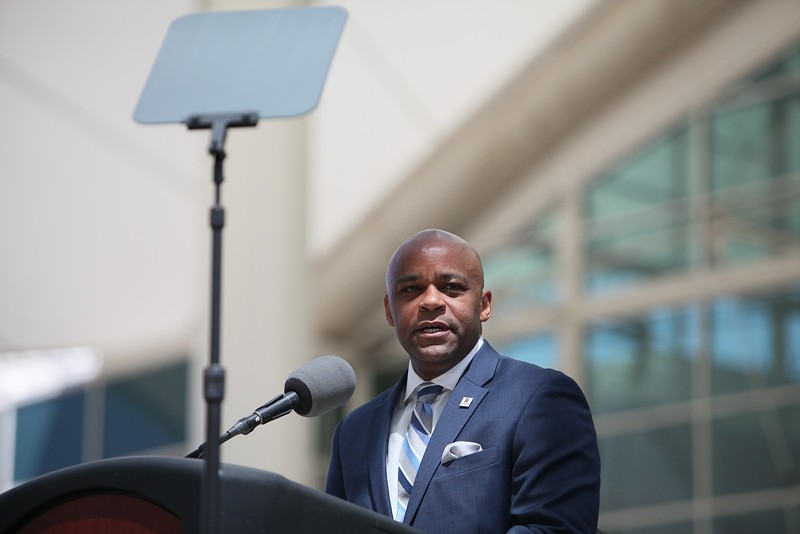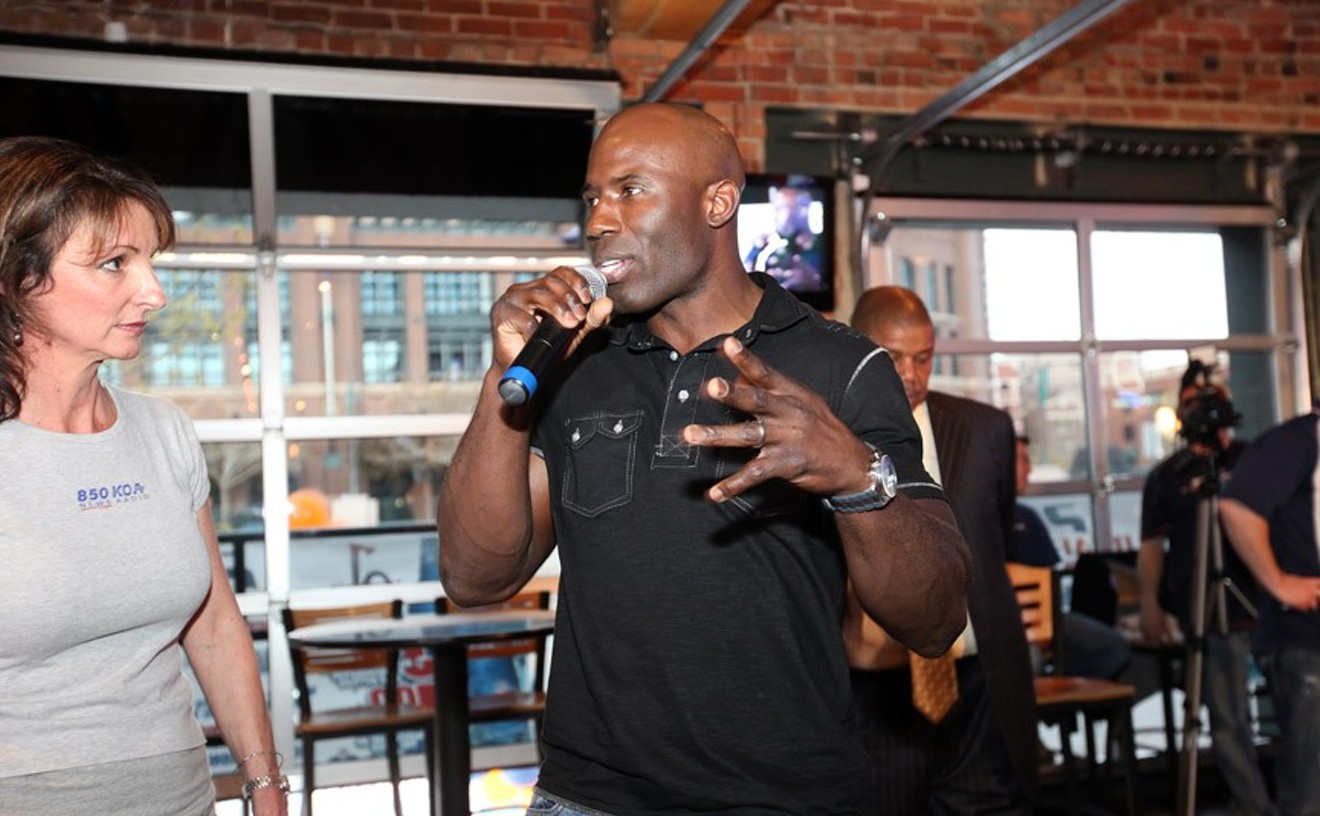Someone should tell Michael Hancock's staff that the mayor is way more relaxed — and seems more like himself — when he goes off script.
On Monday, July 16, Hancock delivered his annual State of the City address to hordes of state and city dignitaries, staffers and regular joes at the new Carla Madison Recreation Center just off Colfax Avenue in City Park West. His speech included anecdotes to help illustrate successful policies (the "little Timmy from Five Points"-type stories), but they seemed forced, especially when compared to the off-script asides and jokes that got more genuine response from the audience and rolled more easily off Hancock's tongue than anything he read. He even brought former Denver Police Chief Robert White to tears with off-script praise for his seven years as head of the force.
More than an exercise in public speaking, the State of the City gave Hancock the chance to wax eloquent about his administration's accomplishments over the past seven years and introduce new initiatives. Since the mayor is seeking a third term, his remarks came off more like a stump speech than a totally honest assessment of the state of Denver.
But then, the positive and uplifting news in these state-of-the-union-type speeches generally require some context. For example, the mayor took credit, in so many words, for the general obligation bond package that passed last year, even though large bond projects have hit the ballot about every ten years for as long as anyone can remember and almost always pass with overwhelming support.
And when he brought up strides that his administration has made in housing the homeless, including some 6,300 individuals and families, there was no mention of the decision in May 2017 to disband the dysfunctional, 43-member Commission to End Homelessness after members complained that they were never advised of the city's controversial sweeps of homeless encampments, among other issues. That commission was later reconfigured and re-formed, and now makes recommendations to the mayor's Office of HOPE, or the Office of Housing and Opportunity for People Everywhere, which Hancock had announced in his 2016 State of the City address. But the first head of that office, Erik Soliván, resigned last February after the Office of HOPE was folded under the Office of the Economic Development.
The most notable new initiative Hancock announced this go-round is the Neighborhood Equity and Stabilization Team, code-named NEST. In his words: "The team will deploy resources specifically tailored to neighborhoods that are under threat of gentrification as new public and private investment comes in. They will jump in with residents and local businesses to understand their needs and blunt any threatened loss of culture, character and community that investment can cause."
It's easy to argue that neighborhoods around Denver have already been irreparably damaged by gentrification, but NEST could turn into more than just something the mayor points to if he's ever accused — much as he was during the Ink! Coffee protests — of failing to stand up for people who are being priced out of the city. (Another off-script remark came when Hancock condemned the coffee shop's marketing and called the ensuing backlash among the "most stunningly painful moments" he'd experienced as mayor.)
The mayor is also working with Denver City Council to double Denver's Affordable Housing Fund to $300 million using marijuana tax revenue, and is launching a program in which city crews walk around neighborhoods with residents to get a boots-on-the-ground look at things that need to be repaired, such as road signs and potholes. And he said he's instructed the Denver City Attorney's Office to "use every legal tool available" to hold opioid manufacturers liable for a health crisis that has killed thousands in Colorado, which is a relatively new trend among municipal attorneys.
Meanwhile, mayoral candidate Kayvan Khalatbari used the current mayor's time in office as ammunition in his response to the State of the City, which he delivered at the Sie FilmCenter immediately after Hancock finished his speech:
"For seven years now, I have listened to the man across the street say and promise things that have not become reality."
Next May's mayoral election is less than ten months away....
[
{
"name": "Air - MediumRectangle - Inline Content - Mobile Display Size",
"component": "12017618",
"insertPoint": "2",
"requiredCountToDisplay": "2",
"watchElement": ".fdn-content-body",
"astAdList": [
{
"adType": "rectangle",
"displayTargets": "mobile"
}
]
},{
"name": "Editor Picks",
"component": "17242653",
"insertPoint": "4",
"requiredCountToDisplay": "1",
"watchElement": ".fdn-content-body",
"astAdList": [
{
"adType": "rectangle",
"displayTargets": "desktop|tablet"
},{
"adType": "rectangle",
"displayTargets": "desktop|tablet|mobile"
}
]
},{
"name": "Inline Links",
"component": "18838239",
"insertPoint": "8th",
"startingPoint": 8,
"requiredCountToDisplay": "7",
"maxInsertions": 25
},{
"name": "Air - MediumRectangle - Combo - Inline Content",
"component": "17261320",
"insertPoint": "8th",
"startingPoint": 8,
"requiredCountToDisplay": "7",
"maxInsertions": 25,
"watchElement": ".fdn-content-body",
"astAdList": [
{
"adType": "rectangle",
"displayTargets": "desktop|tablet"
},{
"adType": "rectangle",
"displayTargets": "desktop|tablet|mobile"
}
]
},{
"name": "Inline Links",
"component": "18838239",
"insertPoint": "8th",
"startingPoint": 12,
"requiredCountToDisplay": "11",
"maxInsertions": 25
},{
"name": "Air - Leaderboard Tower - Combo - Inline Content",
"component": "17261321",
"insertPoint": "8th",
"startingPoint": 12,
"requiredCountToDisplay": "11",
"maxInsertions": 25,
"watchElement": ".fdn-content-body",
"astAdList": [
{
"adType": "leaderboardInlineContent",
"displayTargets": "desktop|tablet"
},{
"adType": "tower",
"displayTargets": "mobile"
}
]
}
]












